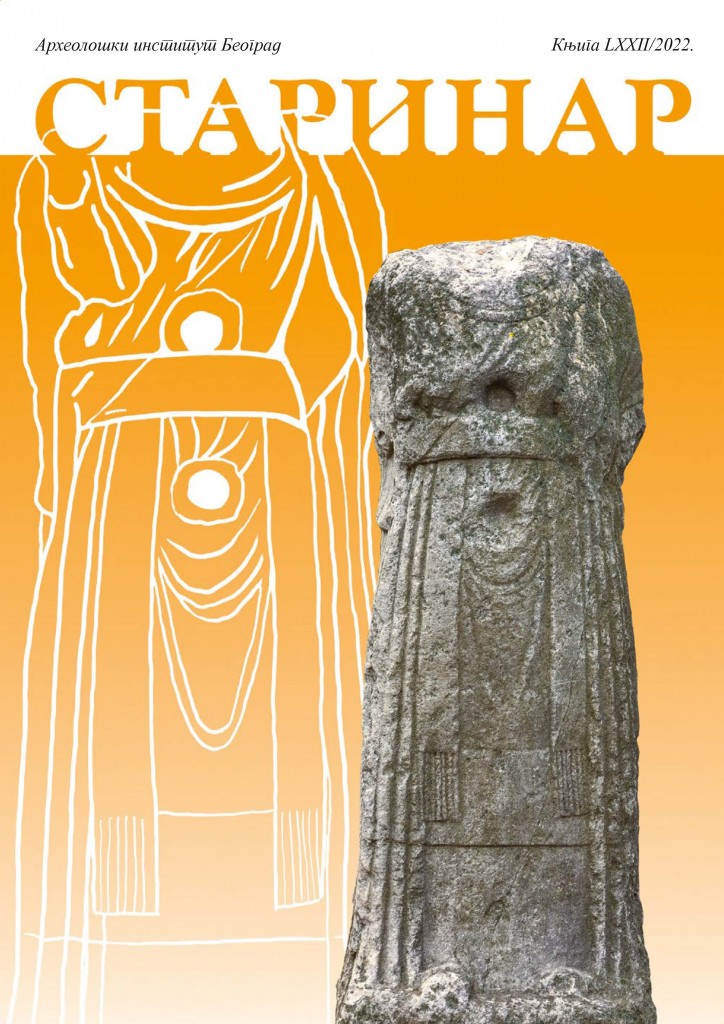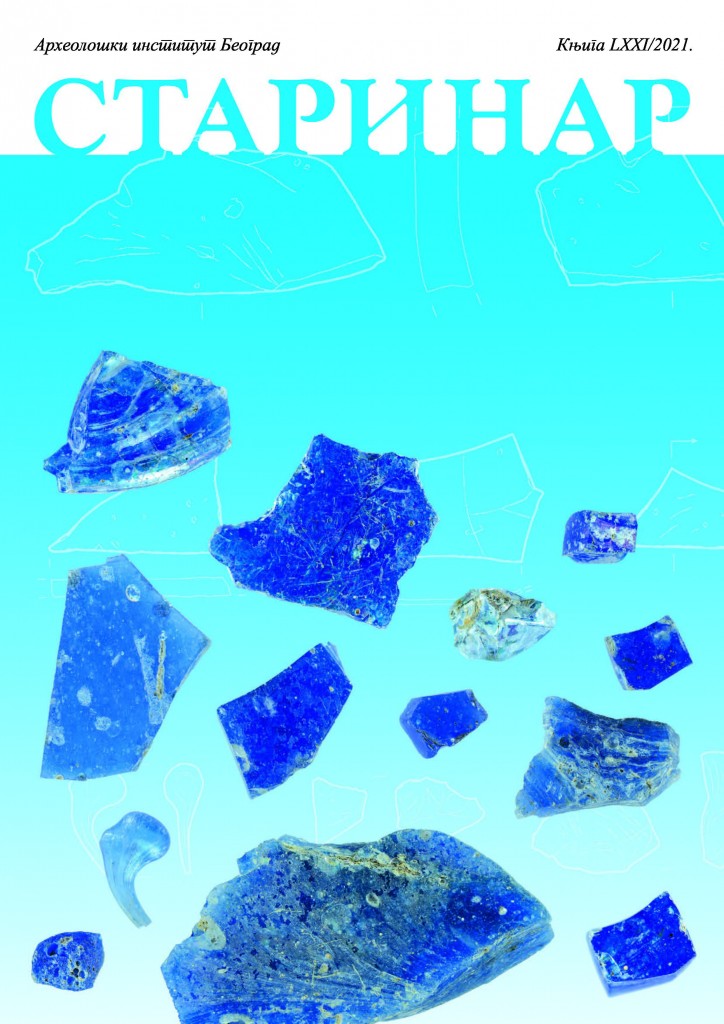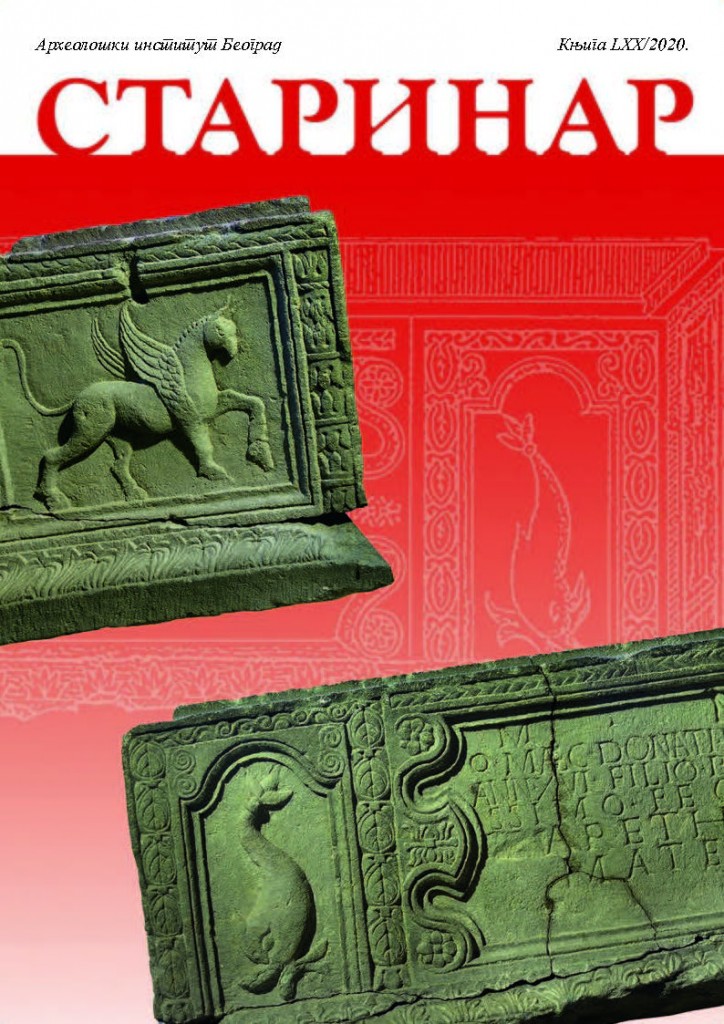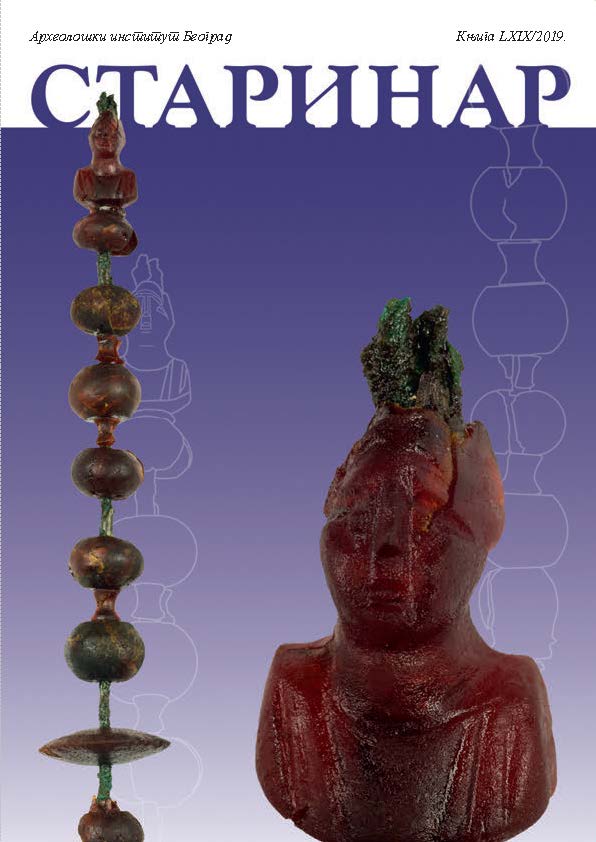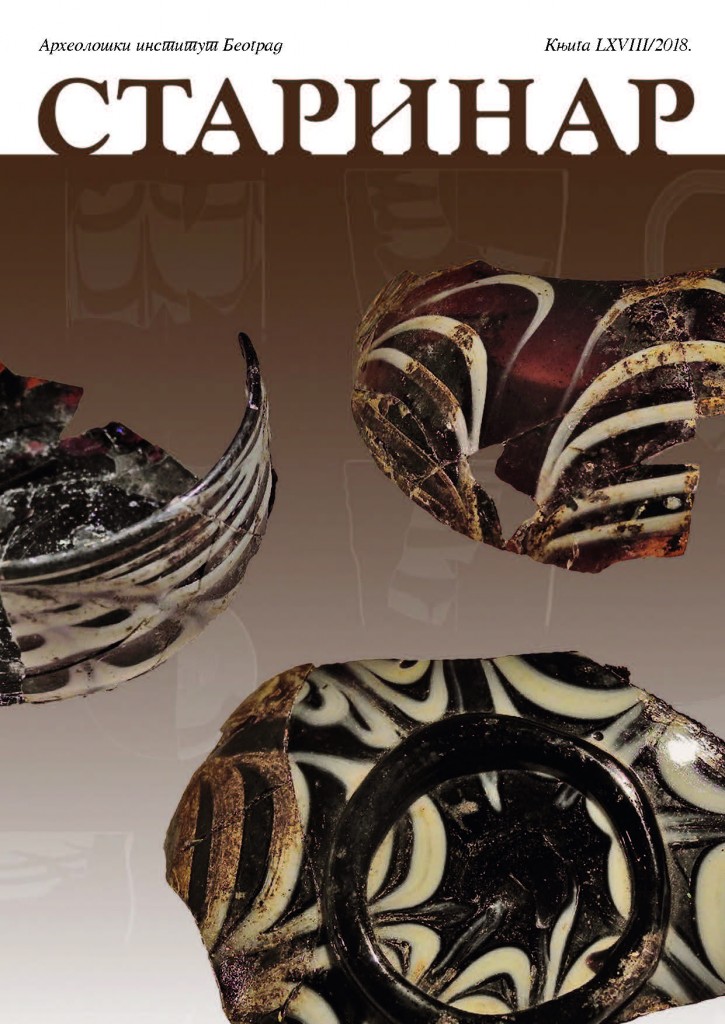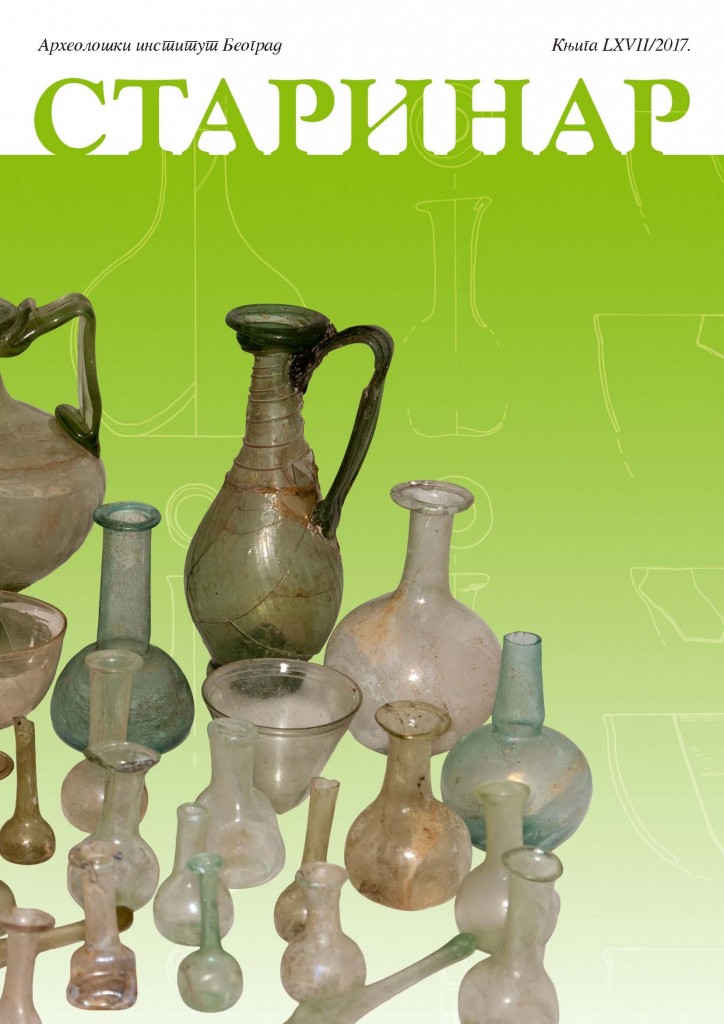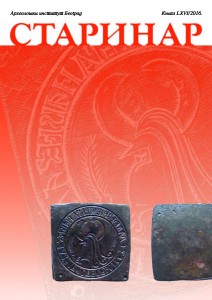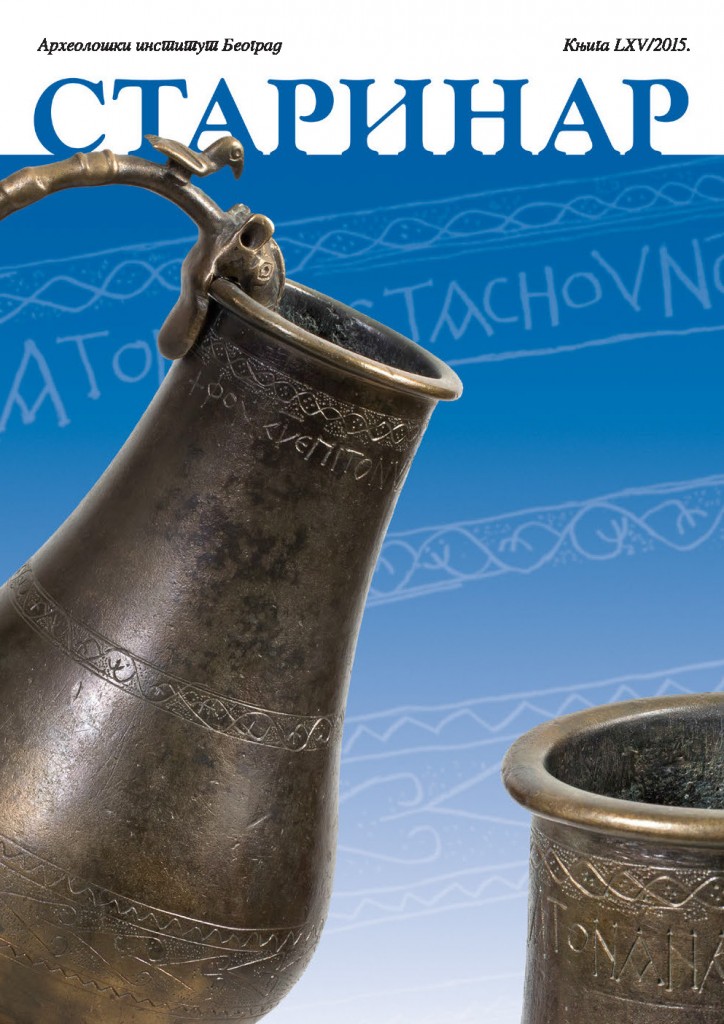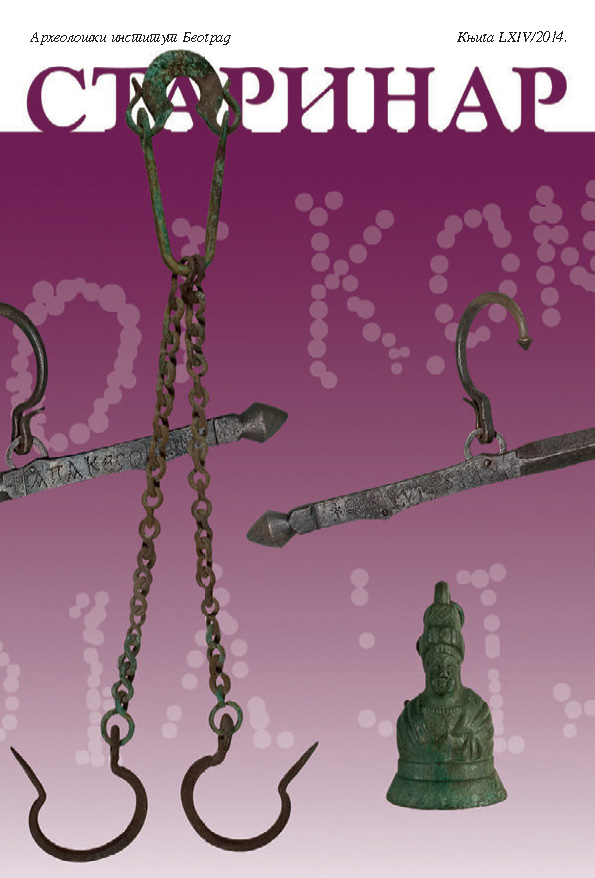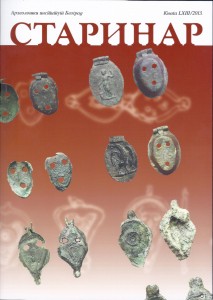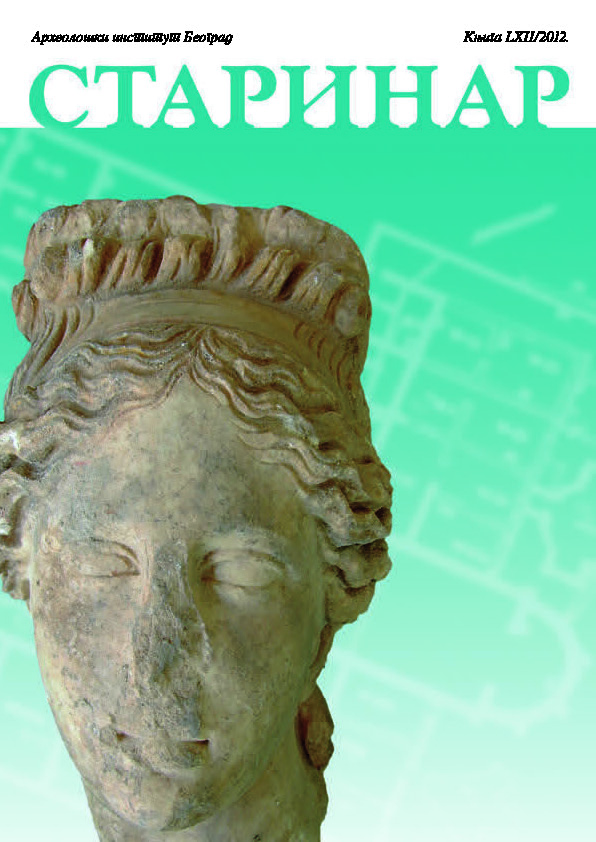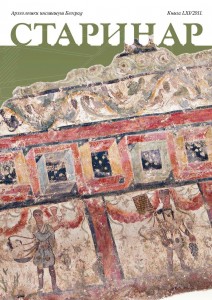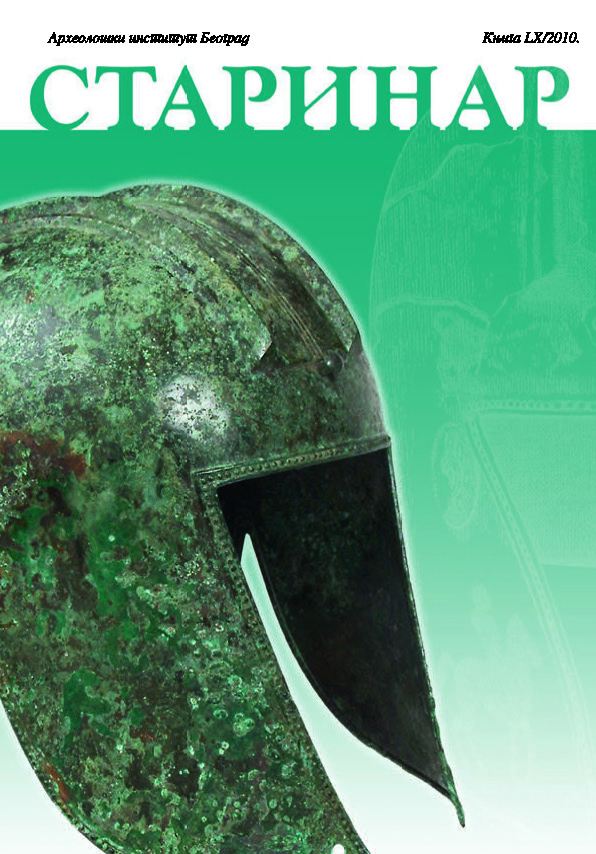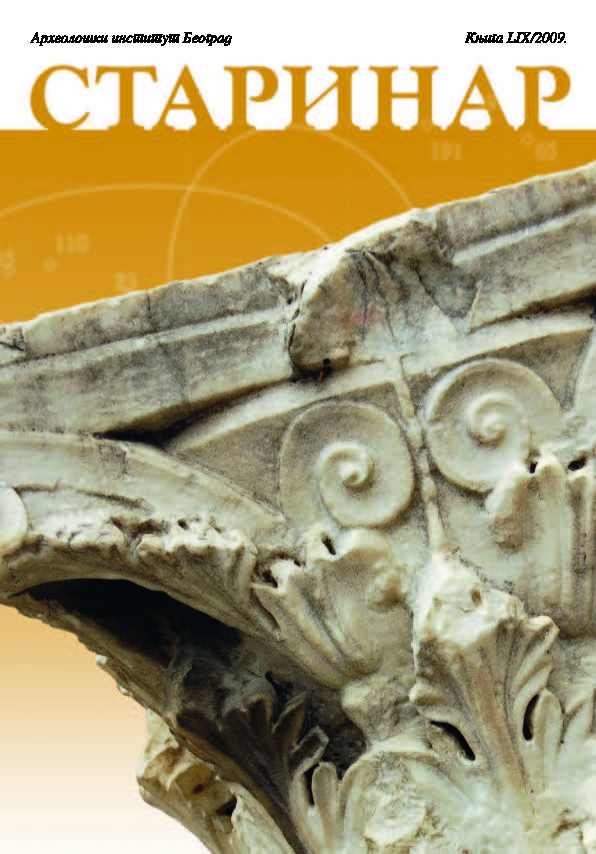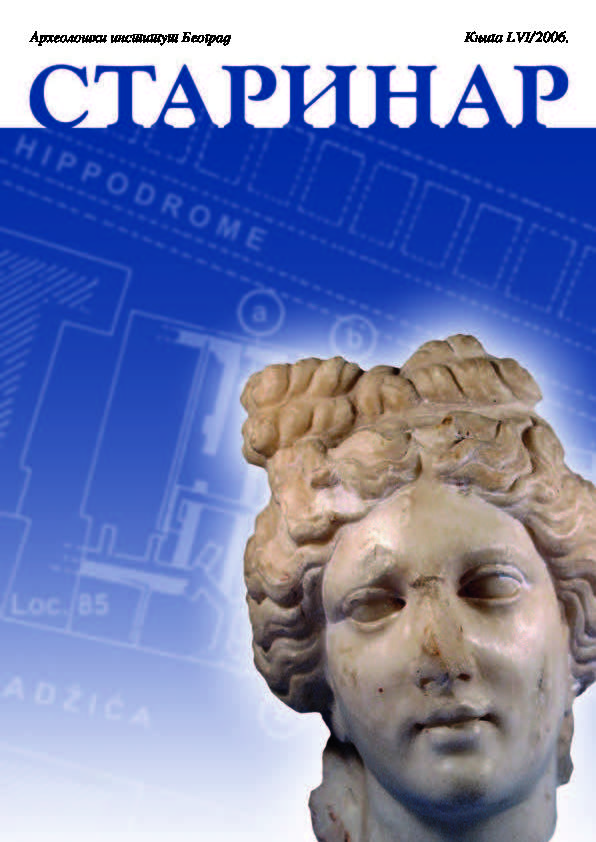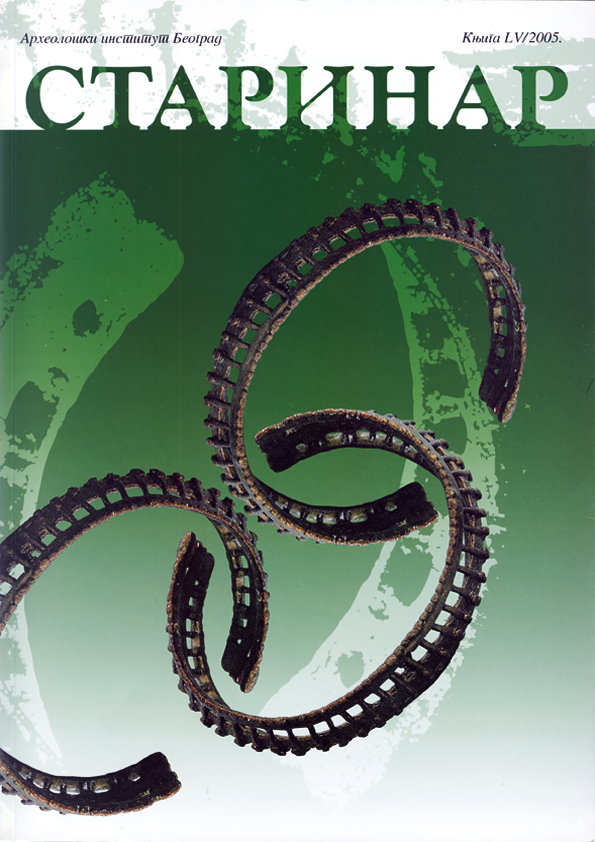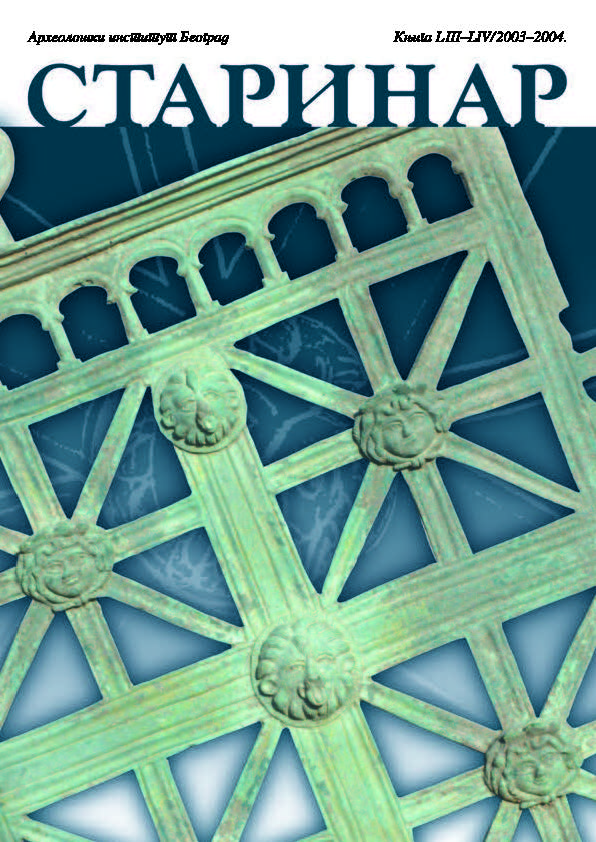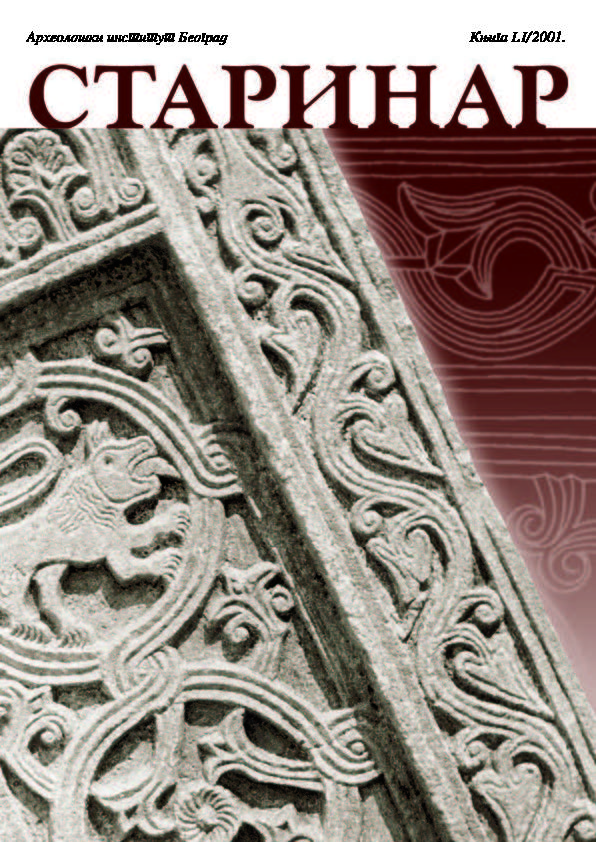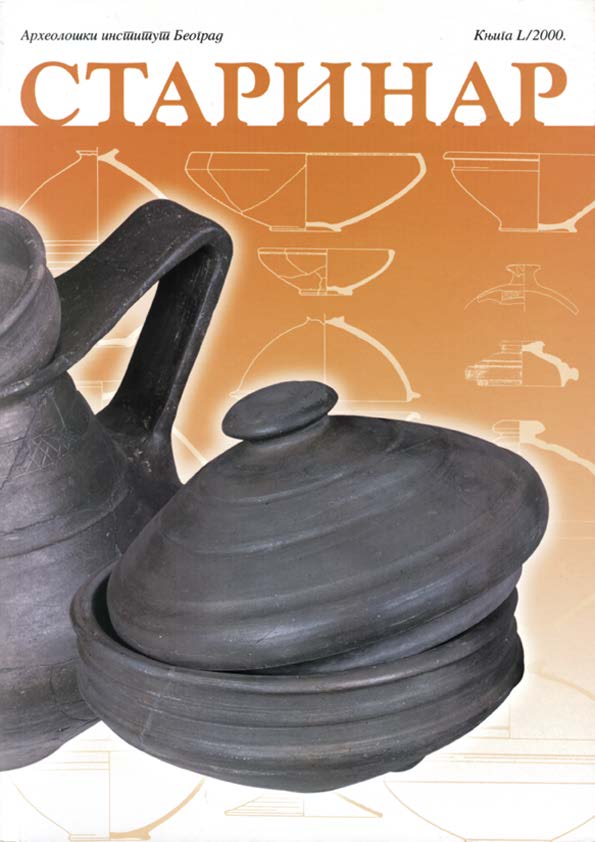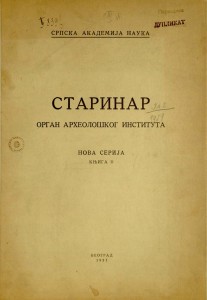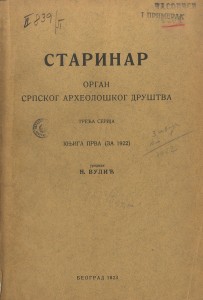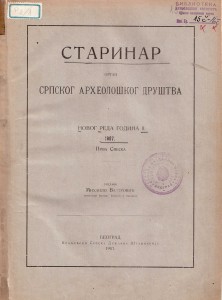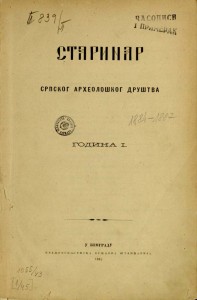STARINAR
Scientific Journal of the Institute of Archaeology in Belgrade
Editorial Policy
Aims and scope
The journal Starinar is dedicated to topics in the areas of archaeology, history, history of arts, architecture and similar scholarly disciplines.
The journal Starinar started to be published in 1884 as a periodical publication issued by the Serbian Archaeological Society, and in 1950 it became the periodical of the Institute of Archaeology in Belgrade.
The journal Starinar publishes original papers that have not been published previously: original scientific articles, excavation reports, scientific reviews, book reviews, critiqical reviews, bibliographies, necrologies. Some issues of Starinar can be dedicated to emeritus researchers in the field of archaeology.
Starinar is an Open Access journal.
Articles can be submitted in English, German or French. If the paper is written in English, summary can be in Serbian (for authors from Serbia) or English (for international authors), while articles submitted in German or French need to have a summary in English.
Papers for Starinar have to be submitted to the editorial secretary and must be formatted in accordance with the Guidelines/Submission instructions for authors. (www.ai.ac.rs/upload/uredjivacka%20politika-ENGL_-FINAL.doc).
The Journal is issued once a year.
Online First option is applied in Starinar: an electronic version of an accepted manuscript is made available online after the Editorial Board accepts the manuscript for publishing and after the editing and proofreading procedure.
Journal Starinar publishes articles from the fields of archaeology, history, architecture, history of arts, classical philology, physical anthropology, etc.
Editorial Responsibilities
The Editorial Board is responsible for deciding which articles submitted to Starinar will be published. The Editorial Board is guided by the Editorial Policy and constrained by legal requirements in force regarding libel, copyright infringement and plagiarism.
The Editorial Board reserves the right to decide not to publish submitted manuscripts in case it is found that they do not meet relevant standards concerning the content and formal aspects. The Editorial Staff will inform the authors whether the manuscript is accepted for publication within 120 days from the date of the manuscript submission.
Editorial Board must hold no conflict of interest with regard to the articles they consider for publication. If an Editor feels that there is likely to be a perception of a conflict of interest in relation to their handling of a submission, the selection of reviewers and all decisions on the paper shall be made by the editor and editorial board.
Editorial Board shall evaluate manuscripts for their intellectual content free from any racial, gender, sexual, religious, ethnic, or political bias.
The Editor and the Editorial Staff must not use unpublished materials disclosed in submitted manuscripts without the express written consent of the authors. The information and ideas presented in submitted manuscripts shall be kept confidential and must not be used for personal gain.
The journal Starinar applies the system of double-blind peer review. Editors and the Editorial Staff shall take all reasonable measures to ensure that the reviewers remain anonymous to the authors before, during and after the evaluation process and the authors remain anonymous to reviewers until the end of the review procedure.
Papers prepared for publishing should be submitted to the editorial secretary between 20 November to 20 December of the current year for the volume that will be published the following year. The Editorial board meets after the submission of all papers. At the first meeting, reviewers are selected and assigned manuscripts for review.
Authors’ responsibilities
Authors warrant that their manuscript is their original work, that it has not been published before and is not under consideration for publication elsewhere. Parallel submission of the same paper to another journal constitutes a misconduct and eliminates the manuscript from consideration by Starinar.
The Authors also warrant that the manuscript is not and will not be published elsewhere (after the publication in Starinar) in any other language without the consent of the Publisher.
In case a submitted manuscript is a result of a research project, or its previous version has been presented at a conference in the form of an oral presentation (under the same or similar title), detailed information about the project, the conference, etc. shall be provided in front of the first footnote and it should be marked with a star. A paper that has already been published in another journal cannot be reprinted in Starinar.
It is the responsibility of each author to ensure that papers submitted to Starinar are written with ethical standards in mind. Authors affirm that the article contains no unfounded or unlawful statements and does not violate the rights of third parties. The Publisher will not be held legally responsible should there be any claims for compensation.
Reporting standards
A submitted manuscript should contain sufficient detail and references to permit reviewers and, subsequently, readers to verify the claims presented in it. The deliberate presentation of false claims is a violation of ethical standards. Book reviews, critical reviews, necrologies and other professional articles are reviewed as well and the decision on their acceptance or rejection is made by the Editorial Board based on reviews.
Authors are exclusively responsible for the contents of their submissions and must make sure that they have permission from all involved parties to make the data public.
Authors wishing to include figures, tables or other materials that have already been published elsewhere are required to obtain permission from the copyright holder(s). Any material received without such evidence will be assumed to originate from the authors.
Authorship
Authors must make sure that all only contributors who have significantly contributed to the submission are listed as authors and, conversely, that all contributors who have significantly contributed to the submission are listed as authors. If persons other than authors were involved in important aspects of the research project and the preparation of the manuscript, their contribution should be acknowledged in a footnote or the Acknowledgments section.
Acknowledgment of Sources
Authors are required to properly cite sources that have significantly influenced their research and their manuscript. Information received in a private conversation or correspondence with third parties, in reviewing project applications, manuscripts and similar materials, must not be used without the express written consent of the information source.
Plagiarism
Plagiarism, where someone assumes another’s ideas, words, or other creative expression as one’s own, is a clear violation of scientific ethics. Plagiarism may also involve a violation of copyright law, punishable by legal action.
Plagiarism includes the following:
- Word for word, or almost word for word copying, or purposely paraphrasing portions of another author’s work without clearly indicating the source or marking the copied fragment (for example, using quotation marks);
- Copying equations, figures or tables from someone else’s paper without properly citing the source and/or without permission from the original author or the copyright holder.
Please note that all submissions are thoroughly checked for plagiarism. Any paper which shows obvious signs of plagiarism will be automatically rejected and authors will be temporary permitted to publish in Starinar.
In case plagiarism is discovered in a paper that has already been published by the journal, it will be retracted in accordance with the procedure described below under Retraction policy, and authors will be temporary permitted to publish in Starinar.
Conflict of interest
Authors should disclose in their manuscript any financial or other substantive conflict of interest that might have influenced the presented results or their interpretation.
Fundamental errors in published works
When an author discovers a significant error or inaccuracy in his/her own published work, it is the author’s obligation to promptly notify the journal Editor or publisher and cooperate with the Editor to retract or correct the paper.
By submitting a manuscript the authors agree to abide by the Starinar’s Editorial Policies.
Reviewers’ responsibilities
Reviewers are required to provide written, competent and unbiased feedback in a timely manner on the scholarly merits and the scientific value of the manuscript.
The reviewers assess manuscript for the compliance with the profile of the journal, the relevance of the investigated topic and applied methods, the originality and scientific relevance of information presented in the manuscript, the presentation style and scholarly apparatus.
Reviewers should alert the Editor to any well-founded suspicions or the knowledge of possible violations of ethical standards by the authors. Reviewers should recognize relevant published works that have not been cited by the authors and alert the Editor to substantial similarities between a reviewed manuscript and any manuscript published or under consideration for publication elsewhere, in the event they are aware of such. Reviewers should also alert the Editor to a parallel submission of the same paper to another journal, in the event they are aware of such.
Reviewers must not have conflict of interest with respect to the research, the authors and/or the funding sources for the research. If such conflicts exist, the reviewers must report them to the Editor without delay.
Any selected referee who feels unqualified to review the research reported in a manuscript or knows that its prompt review will be impossible should notify the Editor without delay.
Reviews must be conducted objectively. Personal criticism of the author is inappropriate. Reviewers should express their views clearly with supporting arguments.
Any manuscripts received for review must be treated as confidential documents. Reviewers must not use unpublished materials disclosed in submitted manuscripts without the express written consent of the authors. The information and ideas presented in submitted manuscripts shall be kept confidential and must not be used for personal gain.
Peer review
The submitted manuscripts are subject to a peer review process. The purpose of peer review is to assists the Editorial Board in making editorial decisions and through the editorial communications with the author it may also assist the author in improving the paper.
To every paper submitted to editorial board of Starinar two reviewers are assigned. Reviewers are prominent researchers, with the same or higher scientific degree as the author(s), competent in the field of the manuscript’s topic. The suggestions on who the reviewers should be are made by the Editorial Board, and adopted by the Editor-in-Chief.
All papers are reviewed by using the double-blind peer review system: the identity of the author is not known to the reviewers and vice versa. Reviewers shall send their reviews within the period of 30 days after the receipt of the manuscript. Reviewers are not paid for this work.
The decision of acceptance of the paper is made by the Editorial Board of Starinar by majority vote based on the peer reviews and the evaluation of the authors’ revision or their arguments, if they did not make changes to the manuscript.
After the final decision on the content of a volume is made, manuscripts are sent for editing and proofreading, and then to a graphic designer, who is responsible for computer layout, design and prepress. Before printing, the authors will have the opportunity to proofread their paper twice in the PDF format. The final approval for printing is given by the Editor-in-Chief. The whole volume should be send to the printing press by 1 October.
The reviewers selected by the Editorial Board, receive a peer review form with questions that they should answer. The purpose of the questions is to indicate all aspects that they should consider in order to make a decision on the destiny of a paper. In the final part of the form, reviewers are supposed to write their opinion and suggestions how to improve the paper. The identity of reviewers is unknown to authors, before, during and after the review procedure. The identity of authors is unknown to reviewers before, during and after the review procedure (until the paper is published). It is suggested to authors to avoid formulations that could reveal their identity. The Editorial Board shall ensure that before sending a paper to a reviewer, all personal details of the author (name, affiliation, etc.) will be deleted and that all measures will be undertaken in order to keep the author’s identity unknown to the reviewer during the review procedure.
The choice of reviewers is at the Editorial Board’s discretion. The reviewers must be knowledgeable about the subject area of the manuscript; and they should not have recent joint publications with any of the authors.
All of the reviewers of a paper act independently and they are not aware of each other’s identities. If the decisions of the two reviewers are not the same (accept/reject), the Editor may assign additional reviewers.
During the review process Editor may require authors to provide additional information (including raw data) if they are necessary for the evaluation of the scholarly merit of the manuscript. These materials shall be kept confidential and must not be used for personal gain.
The Editorial team shall ensure reasonable quality control for the reviews. With respect to reviewers whose reviews are convincingly questioned by authors, special attention will be paid to ensure that the reviews are objective and high in academic standard. When there is any doubt with regard to the objectivity of the reviews or quality of the review, additional reviewers will be assigned.
Procedures for dealing with unethical behaviour
Anyone may inform the editors and/or Editorial Staff at any time of suspected unethical behaviour or any type of misconduct by giving the necessary information/evidence to start an investigation.
Investigation
- Editor-in-Chief will consult with the Editorial Board on decisions regarding the initiation of an investigation.
- During an investigation, any evidence should be treated as strictly confidential and only made available to those strictly involved in investigating.
- The accused will always be given the chance to respond to any charges made against them.
- If it is judged at the end of the investigation that misconduct has occurred, then it will be classified as either minor or serious.
Minor misconduct
Minor misconduct will be dealt directly with those involved without involving any other parties, e.g.:
- Communicating to authors/reviewers whenever a minor issue involving misunderstanding or misapplication of academic standards has occurred.
- A warning letter to an author or reviewer regarding fairly minor misconduct.
Major misconduct
The Editor-in-Chief, in consultation with the Editorial Board, and, when appropriate, further consultation with a small group of experts should make any decision regarding the course of action to be taken using the evidence available. The possible outcomes are as follows (these can be used separately or jointly):
- Publication of a formal announcement or editorial describing the misconduct.
- Informing the author’s (or reviewer’s) head of department or employer of any misconduct by means of a formal letter.
- The formal, announced retraction of publications from the journal in accordance with the Retraction Policy (see below).
- A ban on submissions from an individual for a defined period.
- Referring a case to a professional organization or legal authority for further investigation and action.
When dealing with unethical behaviour, the Editorial Staff will rely on the guidelines and recommendations provided by the Committee on Publication Ethics (COPE): http://publicationethics.org/resources/.
Retraction Policy
Legal limitations of the publisher, copyright holder or author(s), infringements of professional ethical codes, such as multiple submissions, bogus claims of authorship, plagiarism, fraudulent use of data or any major misconduct require retraction of an article. Occasionally a retraction can be used to correct errors in submission or publication. The main reason for withdrawal or retraction is to correct the mistake while preserving the integrity of science; it is not to punish the author.
Standards for dealing with retractions have been developed by a number of library and scholarly bodies, and this practice has been adopted for article retraction by Starinar: in the electronic version of the retraction note, a link is made to the original article. In the electronic version of the original article, a link is made to the retraction note where it is clearly stated that the article has been retracted. The original article is retained unchanged, save for a watermark on the PDF indicating on each page that it is “retracted.”
Open Access Policy
Starinar is an Open Access Journal. All articles can be downloaded free of charge and used in accordance with the licence Creative Commons — Attribution-NonCommercial-NoDerivs 3.0 Serbia (https://creativecommons.org/licenses/by-nc-nd/3.0/rs/.
The submission, review and publishing procedures are free of charge.
Self-archiving Policy
The journal Starinar allows authors to deposit the accepted, reviewed version of the manuscript, as well as final, published PDF version of the paper in an institutional repository and non-commercial subject-based repositories, or to publish it on Author’s personal website (including social networking sites, such as ResearchGate, Academia.edu, etc.) and/or departmental website, and in accordance with the licence Attribution-NonCommercial-NoDerivs 3.0 Serbia
(http://creativecommons.org/licenses/by-nc-nd/3.0/rs/), at any time after publication. Full bibliographic information (authors, article title, journal title, volume, issue, pages) about the original publication must be provided and a link must be made to the article’s DOI.
Copyright
Once the manuscript is accepted for publication, authors shall transfer the copyright to the Publisher.
Authors grant to the Publisher the following rights to the manuscript, including any supplemental material, and any parts, extracts or elements thereof:
- the right to reproduce and distribute the Manuscript in printed form, including print-on-demand;
- the right to produce prepublications, reprints, and special editions of the Manuscript;
- the right to translate the Manuscript into other languages;
- the right to reproduce the Manuscript using photomechanical or similar means including, but not limited to photocopy, and the right to distribute these reproductions;
- the right to reproduce and distribute the Manuscript electronically or optically on any and all data carriers or storage media – especially in machine readable/digitalized form on data carriers such as hard drive, CD-Rom, DVD, Blu-ray Disc (BD), Mini-Disk, data tape – and the right to reproduce and distribute the Article via these data carriers;
- the right to store the Manuscript in databases, including online databases, and the right of transmission of the Manuscript in all technical systems and modes;
- the right to make the Manuscript available to the public or to closed user groups on individual demand, for use on monitors or other readers (including e-books), and in printable form for the user, either via the internet, other online services, or via internal or external networks.
Dislaimer
The views expressed in the published works do not express the views of the Editors and Editorial Staff. The authors take legal and moral responsibility for the ideas expressed in the articles. Publisher shall have no liability in the event of issuance of any claims for damages. The Publisher will not be held legally responsible should there be any claims for compensation.
| Title: | Starinar |
| Web address: | http://viminacium.org.rs/e-biblioteka/starinar/ |
| ISSN: | 0350-0241 |
| eISSN: | 2406-0739 |
| First published: | 1884 |
| Frequency: | annually |
| Subject: | history, archaeology and ethnology; other humanities |
| Publisher: | Arheološki institut |
| Publisher address: | Knez Mihailova 35, 11000 Beograd, Serbia |
| Editor in chief: | Miomir Korać, Institute of Archaeology, Belgrade, Serbia institut@ai.ac.rs |
| Editorial board: | Rastko Vasić, Institute of Archaeology, Belgrade, Serbia Bojan Ðurić, University of Ljubljana, Faculty of Arts, Ljubljana, Slovenia Mirjana Živojinović, Serbian Academy of Sciences and art, Belgrade, Serbia Vujadin Ivanišević, Institute of Archaeology, Belgrade, Serbia Dragana Antonović, Institute of Archaeology, Belgrade, Serbia Snežana Golubović, Institute of Archaeology, Belgrade, Serbia Artur Bankhof, Brooklyn College, New York, USA Natalija Gončarova, Lomonosov Moscow State University, Moscow, Russia Haskel Grinfild, University of Mantitoba, Winnipeg, Canada Mirjana Roksandić, University of Winnipeg, Department of Anthropology, Winnipeg Dominic Moreau, University of Lille, Lille |
PUBLISHER CONTACT INFORMATION
Arheološki institut
Kneza Mihaila 35/IV
11000 Beograd, Srbija
e-mail: institut@ai.ac.rs
Tel. +381 11 2637191
Volumes available online
STARINAR – NOVA SERIJA
Starinar XLIII-XLIV (1992-1993)
Starinar XXXIII-XXXIV (1982-1983)
Starinar XXVIII-XXIX (1977-1978)
